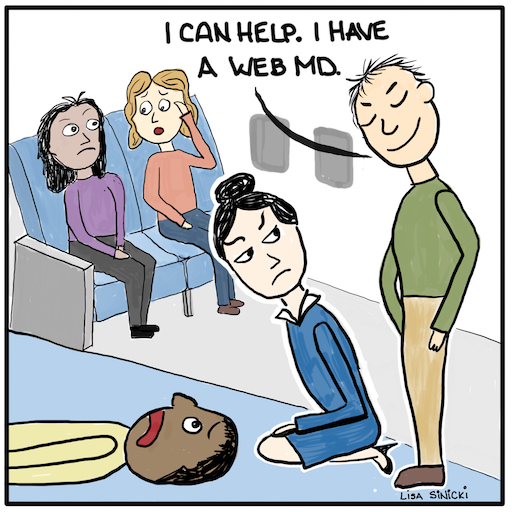The perks of earning your web MD

A few days ago, I woke up at 4am. I must have dreamed about my mother because before I even knew what I was doing I’d reached out, grabbed my phone, opened Google and typed in “breast cancer.”
I’ve been doing that a lot lately. Exercising my “Web MD” to gain insights into how my mother’s disease may progress. Key word to note here is may. As my middle school guidance counselor Miss Wahl would have said—I’m putting the cart before the horse.
Mom’s been in treatment for over three years now, but thanks to newer medications such as Faslodex and Ibrance her cancer has barely progressed over that time. But what will happen if and when the medications stop working? I can’t stop myself from returning to the Internet over and over to try to gain insight.
“Hey Google,” I ask—What will Mom’s symptoms be? How will it impact her life? What are the potential treatments? What are those treatments’ side effects? How quickly will these things happen?
Part of me finds my behavior rational. I’m preparing. Another part can’t help notice the similarity of my current behavior to when we’d whip out the Magic 8-Ball at 5th grade slumber parties to ask about our imaginary boyfriends. Even Mom’s doctor, who I like quite a bit, has no idea what is going to happen. All she can do is share statistics and percentages. Only time will tell which end of the curve my mother will fall into.
So why do I continue to return to the Internet when I know that the information is speculative at best?
When they found a lump in my breast last year, the only thing the technician would tell me was, “It’s probably fine but we’ll need to have you back for a biopsy to make sure.” That wasn’t enough to satisfy a why person like me. So I memorized what I saw on the sonogram, rushed home, and scoured the internet for a similar sonogram image. After an hour of research, I concluded that my lump was likely a cyst but because of its atypical shape (taller than wide), they were going to biopsy it to be sure.
This more detailed explanation comforted me by satisfying my need for a more detailed explanation. (Much the same way some people find comfort in religion.) And ultimately, my web self-diagnosis turned out to be correct—which has reinforced my behavior with a false sense of confidence.
So I Google on, knowing I’m being a bit nutty, hoping to stumble onto some little bit of information that will help me make sense of my mother’s senseless illness. Why people like me need lots of information—and the Internet is a bottomless pit that indulges our need.
I will continue to exercise my Web MD—even if I am using it as a digital version of the Magic 8-Ball. If it gives me comfort, does it really matter?
